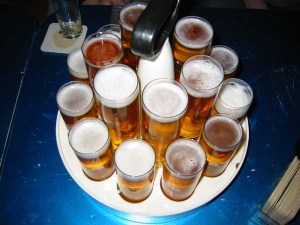Cana Cross
The cross on the left is often associated with marriage rites (see also other Wedding Crosses). But the symbolism is much deeper than other popular designs related to nuptials, such as the lucky horse shoe.
The name Cana comes from the story in John 2:1-11 which tells of a wedding celebration in Cana, near Nazareth in Galilee. Jesus attended the wedding and Wow! What a wedding!
The wedding feast must have been a nightmare to plan, since in those days, the celebrations often went on for a whole week. The party was in full swing when a dishonourable disaster struck; they had run out of booze!
This is where Jesus comes into the story and performs the first of his recorded miracles; he turns water into wine – not just a glass of wine, but a hundred or more litres of superior quality plonk that would blow the socks of any connoisseur!
Far from advocating social drinking, the importance of this miracle is profound and was the first of seven special 'signs' that attested to the divine status of Jesus.
Compared with raising the dead, turning water into wine seems easy peasy.
To suggest this miracle was simply to prove he can do neat party tricks, is missing some very important points.
The head waiter was surprised that the best wine was being served at a time when many guests were too sozzled to appreciate it. And this is the first important point to understand. The theological interpretation is that the Best wine (Jesus, the fruit of the Vine) will come at the end of the wedding (where the bride is the Church).
John 2:6 tells us that the porters were instructed to bring water from pitchers used for cleansing. The Wine was for spiritual cleansing. This is the second point.
Thirdly, this was the public display of the first of many miracles, the start of Jesus' short journey to the Cross. And he chose to start this journey at a wedding. Could there be any stronger confirmation that God thinks marriage is a pretty Good Idea?
Fourthly (and we could go on and on about this), why was so much wine miraculously produced? As the InterVarsity Press New Testament Commentary on John puts it: "here is a free, full, extravagant outpouring, and it is precisely the Son of God's gratuitous, gracious generosity that is the glory revealed in this sign."
Tell me more about the booze!
Jesus chose to not only attend the wedding feast but also to perform his first public miracle there. If we presume this sets God's seal on the sanctity of marriage, then are we also to presume that he wants us to imbibe alcohol?
There are many Christian drinkers who might try to use that excuse, while ignoring the obvious:
- First, it was wine, not high-octane distilled spirit.
- Second, it was Spirit, not wine. The purpose of the miracle was not to give the wedding guests just a 'jolly good time' – Jesus didn't do miracles for fun. He was teaching a profound message, and that wasn't "drink!"

Photo by Tim 'Avatar' Bartel
Do you enjoy an occasional drink?
Many people do, often when socializing with friends and family. Drinking can be beneficial or harmful.
See Rethinking Drinking
It's convenient to forget that the diet and customs 2,000 years ago were vastly different from today. Then, most water available for drinking was not potable; it was mixed with raw sewage, causing diseases such as typhoid and cholera. Wine was prepared with relatively clean water to maintain the taste; consequently wine was healthier than water.
In most industrialised countries now, the regulations for clean drinking water are very much higher than that imposed on wine producers. Things have changed.
What hasn't changed is that Jesus is still the fruit of the Vine and the wedding feast is not yet over!
The Sikh and Hindu faiths have similar, with amrit
Distilleries didn't even exist in those days
Many researchers now dispute some of the benefits, many of which are based on myths and supported by medical research funded by the drinks industry.
Studies which suggest that moderate drinking is beneficial often compare moderate drinkers with tee-totallers, which is as useful as comparing apples to oranges. People who don't drink at all include former alcoholics and people who are in poor health, and that skews the apparent benefits of moderate drinking.
Prof. Tim Stockwell, director of the Centre for Addiction Research at the University of Victoria in Canada, has advised several governments on alcohol guidelines and says that whilst moderate drinking can be sociable, there are no biochemical benefits to drinking.
He notes at least 60 different ways where alcohol has been proved to make you unwell or kill you. A man drinking three to four units a day increases his risk of developing prostate cancer by 23%. Alcohol, any amount, raises a woman's risk of breast cancer. For both men and women, the prospect of liver disease makes drinking a daft idea.


